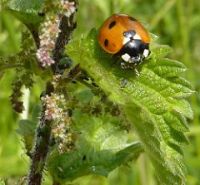Organic Ways To Solve A Problem With Aphids
Organic gardening does not always go without a hitch. The trick is knowing how to react when something goes a little awry and not worrying too much about the odd hole in a leaf or the odd lost plant. Diversity is the key to a resilient garden. It won't mean that you encounter no obstacles or setbacks but it will mean that the plant life in your garden is better able to bounce back.
 Aphids are a common problem and one that many gardeners will come across each year. A few of these tiny insects will not usually pose a problem. But on occasion these can become a garden plague of almost biblical proportions! Even if this is not a problem you have encountered in your garden, it is still worth while knowing what to do if it does, and how to work to try to make sure that it never happens in the first place. As with all things in the organic garden, prevention is better than cure, especially since there is no 'cure' as such, only measures to save your plants in the short term.
Aphids are a common problem and one that many gardeners will come across each year. A few of these tiny insects will not usually pose a problem. But on occasion these can become a garden plague of almost biblical proportions! Even if this is not a problem you have encountered in your garden, it is still worth while knowing what to do if it does, and how to work to try to make sure that it never happens in the first place. As with all things in the organic garden, prevention is better than cure, especially since there is no 'cure' as such, only measures to save your plants in the short term.
Emergency Measures
With a small infestation of aphids, you can simply remove them by hand, cutting off affected bits of the plants and disposing of them properly. With larger infestations, on larger and more robust plants (though not of course, seedlings and delicate plants) you can blast the insects off using a high pressure hose. I would be reluctant to use a soap or essential oil treatment in all but the most extreme of cases, as this will kill or repel not just the insect pests but also your insect helpers. Killing pests without thought can also throw off the balance in your garden. It can even make pest problems worse because by killing every pest, you remove the food source for their predators and these helpful birds and bugs are likely to move elsewhere, leaving the aphid population free to surge!
Preventative Measures
 While you are never going to be able to 100% control what goes on in your garden ecosystem, balance is key to managing the numbers of pests. In a well balanced organic garden, aphids are usually not a problem. You can maintain balance in your garden by:
While you are never going to be able to 100% control what goes on in your garden ecosystem, balance is key to managing the numbers of pests. In a well balanced organic garden, aphids are usually not a problem. You can maintain balance in your garden by:
- Planting to encourage beneficial predatory insects like ladybirds and hoverflies.
- Setting up habitat, homes and other food for insect-eating birds (wrens etc.) in your garden.
- Discouraging aphids by planting alliums and other repellent plants.
- Discouraging ants (which farm aphids) or steering them away from your crops.
- Planting aphid attracting 'trap crops' of cosmos, dahlias and other flowers loved by aphids far away from the crops you want to protect.
Achieve a successful and balanced garden ecosystem and it is far less likely that one type of insect, such as aphids, or any other pests, will get out of control.